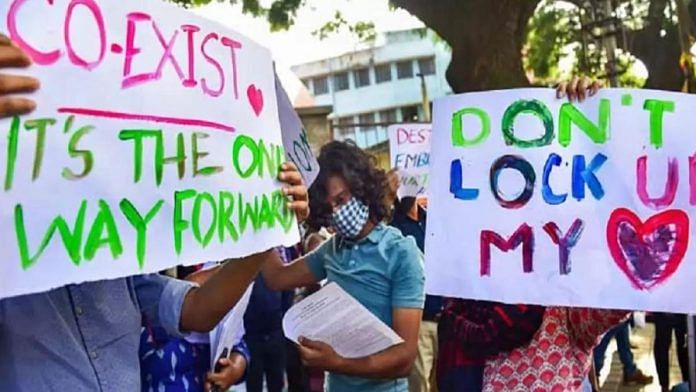The emergence of posters threatening Muslim traders to shut their shops in Uttarakhand’s Uttarkashi district on 5 June was a deeply concerning development. It followed tensions in the region surrounding an alleged abduction attempt on a 14-year-old girl involving two men, one of whom was a Muslim. Local residents have portrayed the incident as a case of ‘love jihad’, a term used by Right-wing groups to describe an unproved theory where Muslim men try to convert Hindu women by wooing them. Love jihad is not officially recognised by courts or the Indian government.
The posters called for Muslim traders to vacate their shops before a mahapanchayat on 15 June to be held by the Devbhoomi Raksha Abhiyan, which campaigns for the “protection of the land of god”. The language used in the posters indicated an attempt to intimidate and marginalise the Muslims living in the area, creating a hostile environment for them to work.
One crucial aspect of the alleged abduction attempt was that only one of the accused was a Muslim, yet it was labelled as a case of love jihad. This raises an important question: What inspires such reactions and beliefs?
Also read: ‘All interfaith marriages not love jihad, but can’t deny facts’ — Hindu Right press…
How every Muslim becomes ‘love jihadi’
The labelling of the Uttarkashi incident as a case of love jihad can be attributed to a combination of factors. Due to their lack of critical thinking, empathy, and a genuine commitment to seek the truth and address the complexity of love jihad, communities end up generalising an entire group. No matter that it is based on the actions of a few individuals. This stereotyping is both unfair and counterproductive and strengthens the idea that Muslim men intend to harm Hindu women. These ingrained preconceptions distort the interpretation of individual actions — and give rise to a broader narrative that assigns collective blame. That is how every Muslim becomes a ‘love jihadi’.
Such generalisations, inspired by a tribalistic mindset of ‘us’ versus ‘them’, are not new in India where entire communities have often faced repercussions for the crimes of individuals. A similar situation arose in Gujarat in 2018 when hundreds of non-Gujaratis fled the state after the police arrested a native from Bihar for allegedly raping a toddler in Sabarkantha. Enraged locals began attacking Uttar Pradesh and Bihar migrants after the incident, and 170 people were arrested in connection with the violence.
Also read: Haryana ‘love jihad’ law puts first case to litmus test—govt agenda, Sangh help, new…
The subtle discrimination
In the Uttarkashi incident, though, there appears to be another factor at work besides the othering of the Muslim community. There is also a strain of microaggression against minorities — where individuals engage in subtle forms of discrimination and bias toward a particular group. Such attitudes are manifested through verbal or non-verbal slights, dismissive behaviours, or subtle acts that communicate derogatory messages or reinforce stereotypes.
An instance of microaggression sprouted this week too in connection with the Mahasabha posters. Brij Mohan Chauhan, president of the Purola Vyapar Mandal, called for “a verification drive” targeting Muslim traders and shopkeepers and suggested that those deemed “delinquent” should not be permitted to remain in the town. This statement stereotypes the Muslim community as a potential threat, warranting special scrutiny of them. While it is essential to address any concerns related to criminal activities, one must do it without harbouring a bias against a community’s religious identity.
What fuels the fear
In India, vocal sections of the ultra-Hindu Right-wing, both on social media and other platforms, consistently generalise the Muslim community. Love jihad is just one manifestation of it. Such actions disregard nuance and fail to acknowledge that such cases may exist but they are exceptions rather than the norm.
Certain activities of Muslims are perceived as a threat by other communities. One such concern is conversion, as the fervent desire to bring non-Muslims into the fold of Islam can be interpreted as an attempt to alter the demographic landscape. Consequently, people start expressing fears about their safety. This further strengthens suspicions of love jihad and forced conversions. Uttarakhand Governor Gurmit Singh approved the Freedom of Religion (Amendment) Bill 2022 in December last year, making unlawful conversions a cognisable and non-bailable offence in the state. This bill imposes a prison term of up to 10 years as a punishment for such conversions.
The fate of minorities in Kashmir, a Muslim-majority state, further fuels the fears of conversion to Islam and demographic changes among the majority population in India. And there have been few mitigation efforts from Muslim intellectuals and society. They have not effectively engaged in addressing these conversations and have shown a lack of introspection, which contributes to the existing fault lines between different communities.
Dialogue, discussion, diversity
Promoting interfaith dialogue is one approach to combat othering. At the same time, Muslims must acknowledge that collective efforts toward reform, inclusivity, and equal respect for other religious groups have been lacking in their community. They must work toward it now. It is imperative for individuals who reject problematic views to be vocal and actively advocate for change to create a more progressive and harmonious society. Separatist tendencies and the absence of vocal opposition to regressive attitudes within the Muslim community have contributed to the distortions of their perceptions in society.
Political and ideological motivations can further polarise and worsen social dynamics. Opportunists will exploit incidents — like the Uttarkashi case — to advance divisive agendas and garner support based on religious or communal identities. Manipulating facts and amplifying communal tensions serve their interests. Only through constant efforts by all stakeholders can we dismantle divisive narratives and cultivate an inclusive and cohesive society for all.
Amana Begam Ansari is a columnist and TV news panelist. She runs a weekly YouTube show called ‘India This Week by Amana and Khalid’. She tweets @Amana_Ansari. Views are personal.
(Edited by Humra Laeeq)



